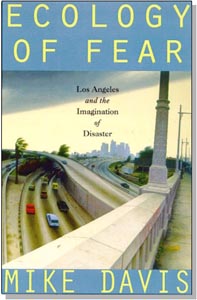![[Metroactive Books]](/books/gifs/books468.gif)
[ Books Index | Metro | Metroactive Central | Archives ]
The City of Angles
By Jeff Kearns
ONE OF THOSE mass-forwarded email jokes that recently made the rounds posited some witty exhibits that the new Tech Museum should have included to really capture life in Silicon Valley: the 680 Trail of Tears Commute, the 80-Hour-Work-Week Simulator and the Apple Stock Roller Coaster.
But for those who catch themselves drowning in self-pity and obsessed with the vicissitudes of keeping pace in the Silicon Valley fast lane, it might be a good idea to check out Mike Davis' Ecology of Fear. The book is a phantasmagorical portrait of Los Angeles perched on the edge of the millennium and ready to fall off the edge into the kind of oblivion frequently visited upon the city in books and movies.
Davis picks up where his 1990 book, City of Quartz, left off, with an exhaustively researched tome detailing the history of myopic urban policy making almost always based on one thing: fear. Although the city itself--for residents, visitors and moviegoers alike--seems surreal by almost any standard, Davis paints a picture of a metropolis so poorly conceived that its own destruction doesn't seem that far-fetched at all.
Los Angeles is not being destroyed by mud slides, tsunami, meteors, earthquakes or killer bees. Instead, the real damage is being done by the cold paranoia of white flighters building walled colonies farther and farther out in the desert and former orchard valleys while the city's core continues to collapse into itself like a dying star.
How bad is it? The book barely even mentions traffic.
Davis begins the tour with a history of how Los Angeles literally sprawled out into the path of its own disasters. Malibu, for example, couldn't be designed better to burn every few years. Davis contrasts the $100-million effort to save Malibu and other tony, star-studded suburbs with the almost total lack of fire protection for the urban underclasses. And after the hills burn, they lie naked until they slide away as torrents of mud.
Much of the blame for the region's poor design lies with the greedy developers and corrupt officials responsible for places like the San Fernando Valley, which was intended to be developed around 16 densely populated "nodes" connected by public transportation and surrounded by orchards and open space.
Tornadoes (in L.A.?) get their own chapter. These specters of Midwestern weather woes have been long ignored by the press and government officials wary of breaking the region's highly marketable spell of beaches, palms and eternal blue skies.
At times, Davis slips into more whimsical modes, with accounts of a zany, slapstick eschatology that reads a bit like a Bob Dylan sequel to the book of Revelation: tornadoes cause downpours of poultry, tear the clothes from a flagpole sitter caught in mid-sit (he lived) and down power lines with flying seaweed.
MOST ILLUMINATING is a chapter on how Los Angeles envisions its own destruction, with a deep subtext of racism and xenophobia embedded in hundreds of books and films, from a 19th-century novel about a takeover by Chinese laborers to the invasion of giant ants in the 1954 film Them! to aliens in Independence Day.
Davis ends with his own futuristic destruction of the city, which is based on his careful extrapolations of an expanding statewide prison-industrial complex, omnipresent surveillance, racist cops, evaporating public space and the grotesque CityWalk at Universal Studios.
Ironically, the original plan called for an urban-renewal scheme in Hollywood, but it was scrapped in favor of building a faux-urban neighborhood and a fake street lined with shops in the middle of Universal City. Science-fiction writers couldn't have dreamed up a more poetic summary of the city.
Although Davis' prose is unmistakably academic (he teaches at UCLA), Ecology of Fear is a slightly more relaxed follow-up to the stiffer and darker City of Quartz. And it's every bit as rewarding. But best of all, it makes Northern California feel like Eden.
[ San Jose | Metroactive Central | Archives ]
Copyright © Metro Publishing Inc. Maintained by Boulevards New Media.
![]()
 No matter how you look at it, Mike Davis says in 'Ecology of Fear,' L.A. is in trouble
No matter how you look at it, Mike Davis says in 'Ecology of Fear,' L.A. is in trouble
Ecology of Fear by Mike Davis; Metropolitan Books; 421 pages; $27.50 cloth.
From the December 31, 1998-January 6, 1999 issue of Metro.